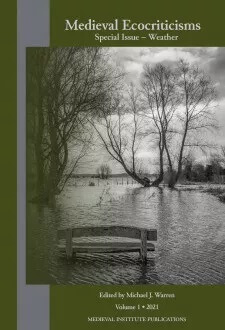“Medieval Ecocriticisms,” a scholarly group and journal founded by Heide Estes, Ph.D., professor of English, recently published its first issue, “Medieval Weathers” (Medieval Institute Publications, 2021). The journal, co-edited by Michael J. Warren, independent scholar, and lse Schweitzer VanDonkelaar, Ph.D., assistant professor at Michigan State University, is the first publication dedicated to this field of study, which explores the intersection of literature and the environment in the global Middle Ages.
This inaugural issue focuses on the key topic of weather and features an article by Estes, “Weather and the Creation of the Human in the Exeter Book Riddles,” as well as an introduction from Warren and other contributors who write about weather phenomenon that exist in medieval literature. “…Weather was profoundly important in medieval life and culture, and […] it turns up frequently in various genres of text,” writes Warren.
Estes, who is passionate about environmental issues, originally had the idea to blend her interest with her area of study while working as a visiting researcher at the University of Cambridge in 2005, when she gave a talk on wilderness in the Old English poem, “Guthlac.” In 2012, she registered “Medieval Ecocriticisms” as a society with the International Congress on Medieval Studies, which would ultimately launch the journal in 2021.
The journal is dedicated to publishing yearly journal issues, sometimes thematic, covering a wide and inclusive spectrum of approaches and methods in interdisciplinary ecocritical studies, including: ecofeminism and new ecocritical analyses of under-represented literatures; queer ecologies; posthumanism; waste studies; landscape studies; maritime studies and blue humanities; studies of environmental catastrophe and change and their effects on pre-modern cultures; as well as more traditional approaches that, nonetheless, are concerned with the ecological and environmental in some way. The board is open to submissions in literary and cultural studies, philosophy, environmental history, art history, environmental archaeology, zooarchaeology, and beyond.


